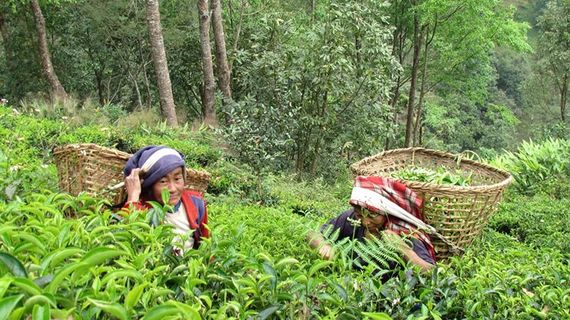by Alina Saba,
Researcher, Mugal Indigenous Women’s Upliftment Institute
Excerpted from the Huffington Post

Tea gathering in Nepal
When I was born in an Indigenous Limbu village of Eastern Nepal, no one had heard of climate change. Our communities struggled to make their living from land amidst armed conflict, feudal hierarchies, strangling debt and disasters that were slowly increasing. It was impossible, then, for anyone in the village to imagine that I might one day speak at the United Nations during a Climate Summit that will bring world leaders together to address the world’s biggest problem.
I am the first person from my village to obtain a university degree. With this enormous privilege I decided to focus on the rights and development of Indigenous peoples and quickly realized two things. First, threats to our lands threaten our livelihoods, our culture, and our very existence. Second, Indigenous women across the world, particularly in least developed countries like Nepal, are the least audible, most excluded and seemingly the most expendable when the world is focused on maximizing profits and consumption.
…
My work is part of a regional project to empower the most marginalized women to determine their own solutions to climate change. Through the Asia Pacific Forum on Women, Law and Development (APWLD), I have met women from the Carteret Islands who are amongst the first climate refugees, women working with the survivors of Typhoon Haiyan in the Philippines, and women from Bangladesh working with the Munda Indigenous community who are losing their lands to salinity and flooding in a country that anticipates at least 20 million displaced people by 2050.
….
For us, the answers to climate change are simple and were promised decades ago. The answers are not the creation of markets for carbon — markets that cause women in Indonesia for example to lose their access to forests. The answers are not to create more dangerous nuclear power in India or more hydro that displaces poor women yet fails to give them power in Nepal, India and Vietnam.
The answers lie in human rights and equality. The gargantuan threat of climate change should force us to re-think global systems that are disastrous for the planet and deeply inequitable. These systems mean 85 people in the world have more wealth and consume more than 3.5 billion people — half the world’s population. Our survival is dependent on governments making binding and drastic commitments to reduce emissions. But it is also dependent on a commitment to finally deliver on human rights promises and provide Development Justice to all.
As governments continue to negotiate our climate future I will be asking them to look Indigenous women in the eyes and answer us: whose lands will be traded away? Which cultures will be lost? And whose lives will be discarded in these negotiations?
Full texthere http://www.huffingtonpost.com/alina-saba/what-climate-change-means_b_5890456.html
——————————-
Alina spoke at the climate Summit 2014, an effort by the UN SEcretary General to make world leaders commit to action climate change. Alina was one of the 4 chosen civil society speakers drawn from an open application process that attracted more than 500 applications. As the only speaker from Asia she will bring attention to the destructive impact of climate change in the region but particularly to the impact on the most marginalised – Indigenous women.





